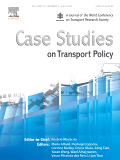
This study aimed at assessing the role of travel information provision on behavioral changes in daily mobility in the metropolis of Montpellier in France. We focused on commuter behavior using data collected through an online survey on mobility behavior during the summer of 2015. We found that while 73% of commuters respondents use travel information sources, only 31% of them declared any mobility behavior change. This study explores the impact of specific factors such as socio-demographic variables (e.g., age and gender) and transportation habits (e.g., public transportation pass, travel time, and safety margin). As an operational measure of the prudent behavior, safety margin highlights the threshold effect of travel information provision on behavioral changes. Indeed, three commuter profiles can be distinguished according to their prudence levels: chronically non-prudent, reasonably prudent, and excessively prudent. Finally, the study highlights that travel information provision alone may not be enough to induce a shift in behavioral changes among commuters toward more environment-friendly modes of transportation.
